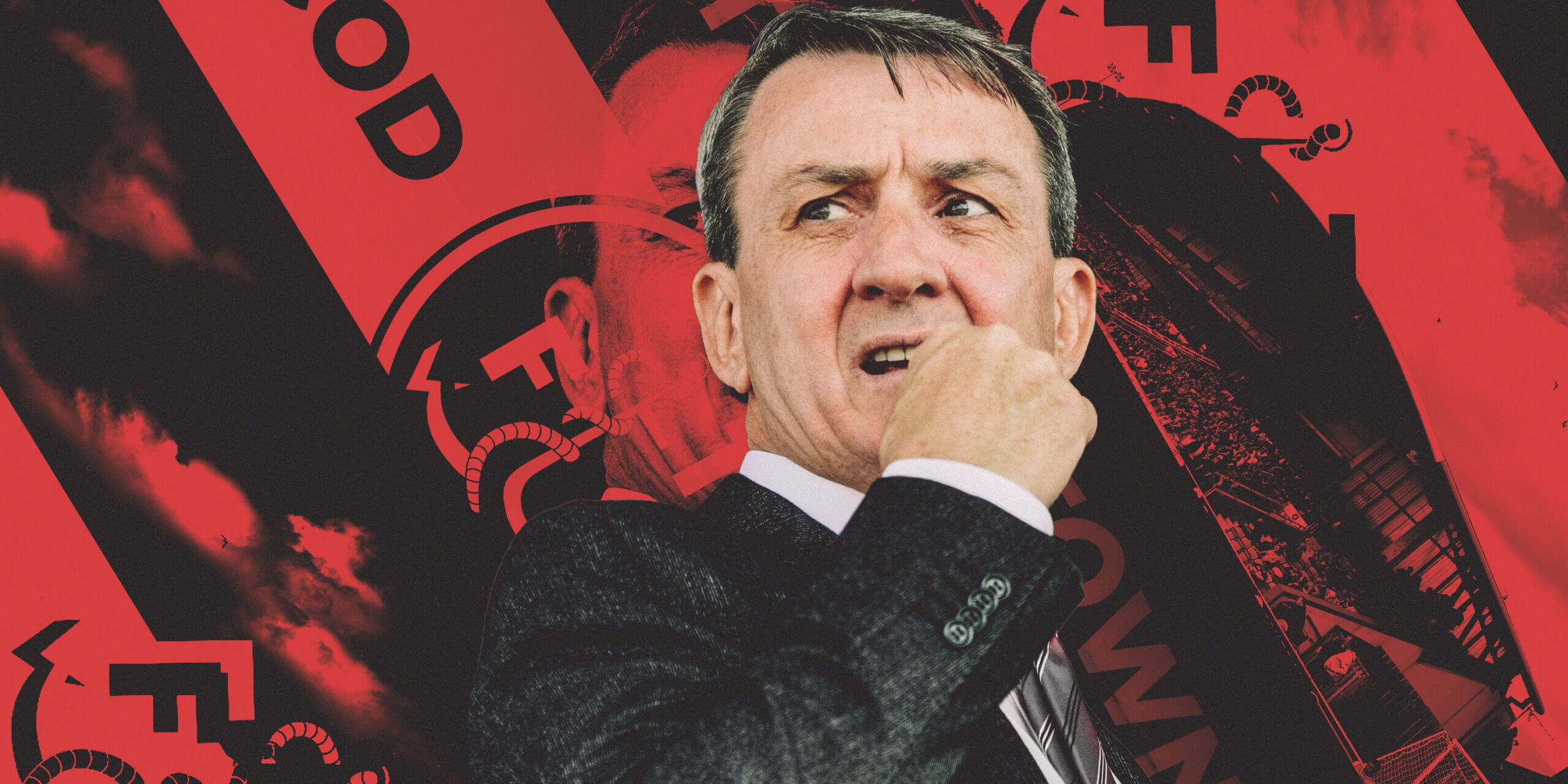At a forum for Fleetwood Town fans this season, there was an unusual special guest — one who had recorded an audio thank-you from prison.
Last summer, the owner of the club in England’s third tier, Andy Pilley, was sentenced to 13 years for ripping off small businesses and charities up and down the UK via his utilities companies, stealing money from vulnerable people and becoming rich in the process.
Yet, overlooking the halfway line at the club’s Highbury Stadium, there is still a shrine to the man who was also imprisoned in 1998 for conspiracy to steal from the Post Office and last year was convicted of crimes which a judge described as a “sordid tale of squalid lies, greed and fraud”.
“There’s only one Andy Pilley,” — a phrase chanted by Fleetwood fans at away games this season — says the banner put up by fans just outside the stadium grounds.
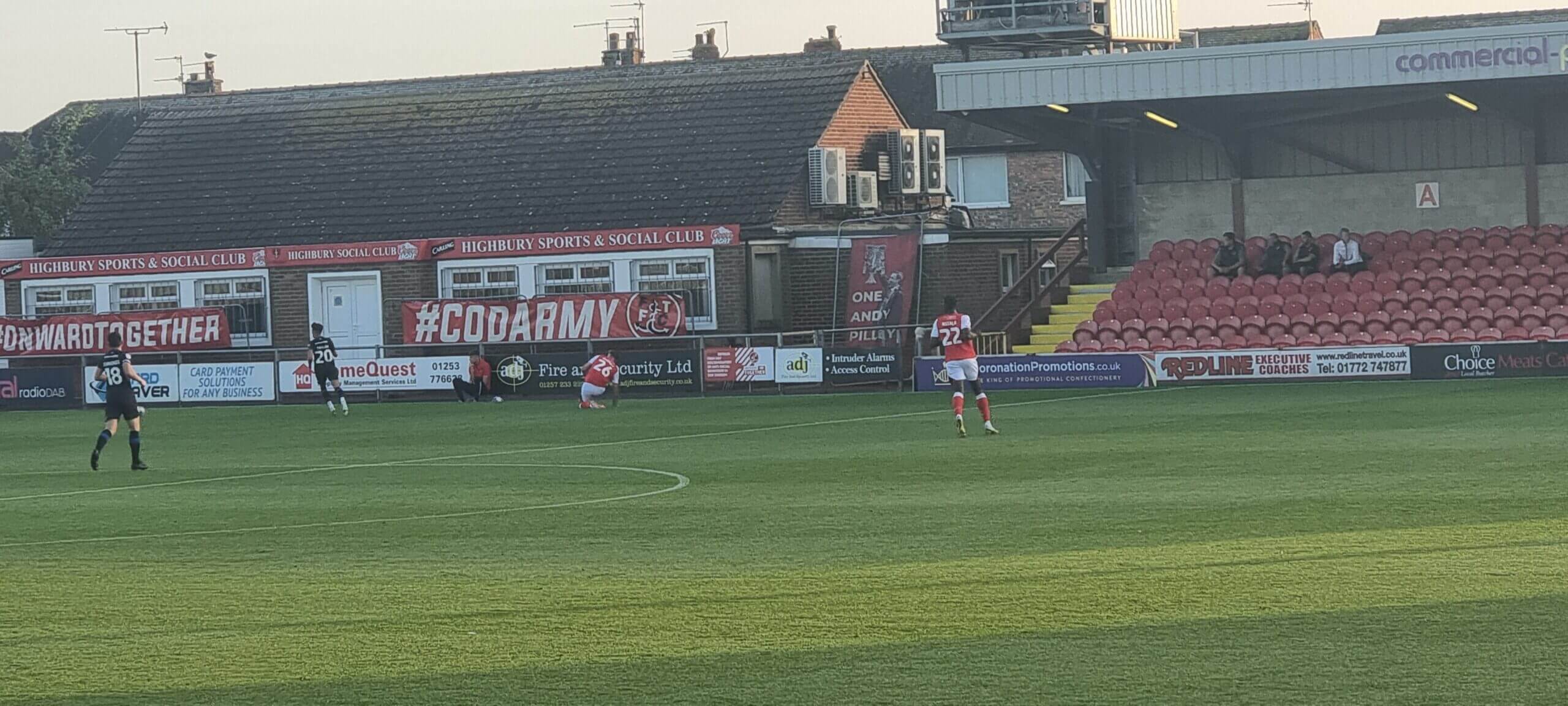
The banner of Pilley was clearly in vision when The Athletic went to a game at Highbury in September (Joey D’Urso/The Athletic)
Pilley oversaw six promotions at Fleetwood, taking the club from the 10th tier to the third in a decade, despite the north-west town (population: 26,000) being the smallest with an English Football League club.
Fans still sing his name, even though the club are onto their third manager of the season, former Liverpool and Blackpool player Charlie Adam. Fleetwood are also 23rd in League One, seven points from safety.
Though the evidence was swiftly deleted from the Facebook group ‘Cod Army’ — the club’s nickname which reflects the area’s fishing history — Pilley, 53, addressed the fans’ forum late last year with a brief audio message recorded from prison.
“Andy Pilley issued a thank you message to fans for their support during the trial and asked them to continue their support for the club in the years to come,” Fleetwood Town told The Athletic. “This was to a group of supporters and not released into the public domain. He asked the supporters to stand by the club and continue the good work the club does for the community. This was a very brief thank-you message.
“Andy Pilley is a huge part of the Fleetwood Town story after 20 years of investment and service. He remains a hugely popular person in the town and local area, not only due to his investments into the football club but also local charities and the wider community.”
Despite resigning as a director of the club’s parent company immediately after his conviction, Pilley still owns Fleetwood Town.
EFL rules required him to divest his shares after the “disqualifying event” of his lengthy prison sentence, but nine months after his conviction, this has not happened.
The club says it is in a “continued dialogue” with the EFL about a change of ownership. “Andy Pilley (is) in the process of divesting of his shares,” a spokesperson said. “Mr Pilley resigned as a director of the club shortly after the verdict.”
The group of energy companies Pilley founded in 2002, BES Utilities, is still deeply intertwined with the club on which he has spent £30million ($38.1m). Its logo is on the team’s shirts and the company headquarters is based in the stadium.
The BES Utilities group includes BES Commercial Electricity Ltd and Business Energy Solutions, both of which are based in the Parkside Stand at Fleetwood Town Football Club.
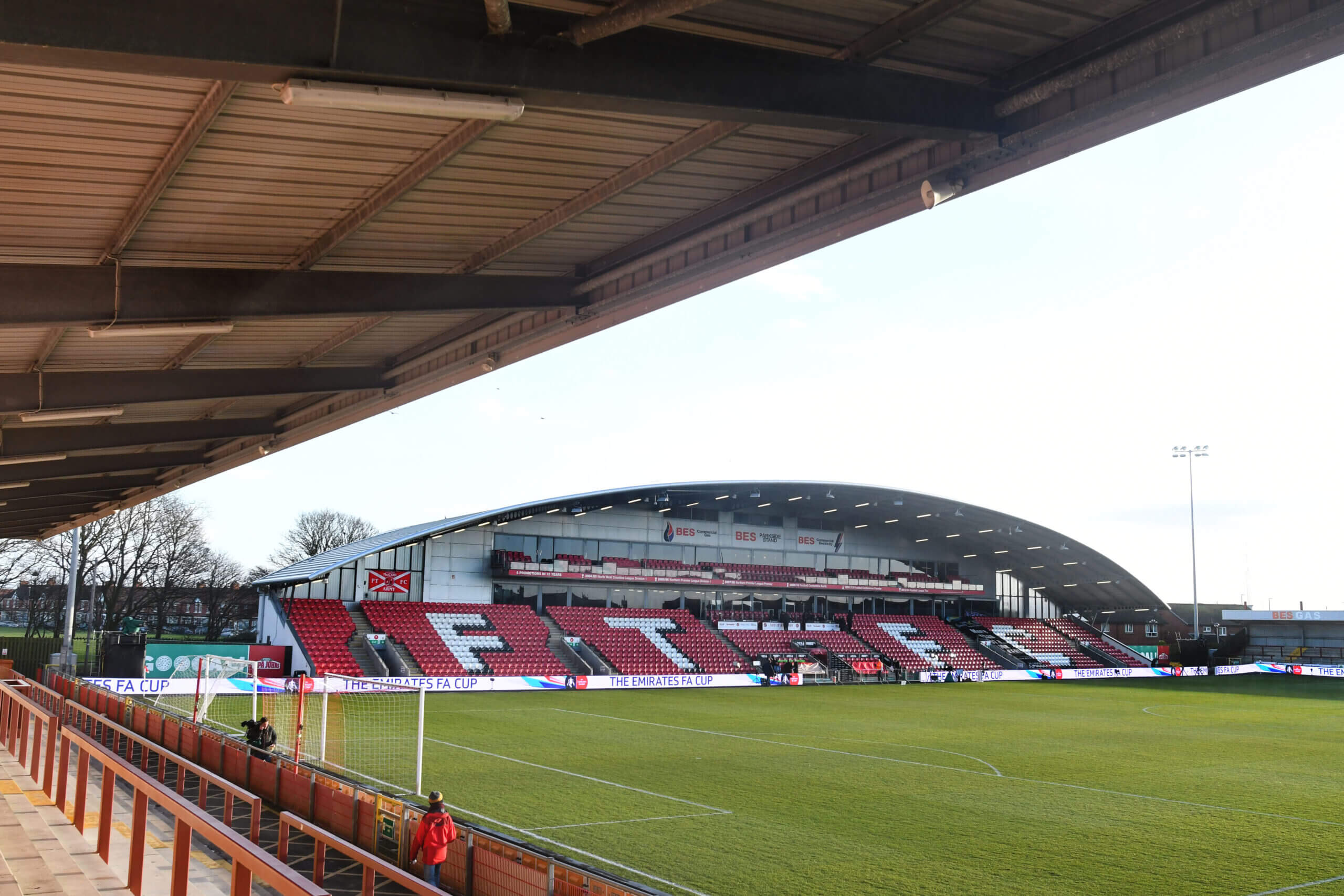
Fleetwood’s Highbury home (Paul Ellis/AFP via Getty Images)
The sentencing remarks in the criminal case against Pilley made clear the BES companies were deeply involved in his frauds, alongside the energy broker he owned, Commercial Power Ltd. But the conviction was against Pilley as an individual, not against any of the utilities firms.
The UK energy regulator Ofgem (Office of Gas and Electricity Markets) is investigating BES — though not Commercial Power — over “unduly onerous” historic charges to customers.
In 2019, Pilley said the closure of BES Utilities would mean the club would be “likely to lose its Football League status”. The most recent set of Fleetwood accounts, which are only to June 2022, says the club owes companies owned by Pilley more than £23million, most of which is to Commercial Power Ltd.
However, Fleetwood say they no longer owe any funds to Commercial Power or BES. Smaller sums were owed to the two BES companies now under Ofgem investigation: £950,000 to Business Energy Solutions and £650,000 to BES Commercial Electricity.
The Athletic has spoken to eight small businesses that are BES Utilities customers and they are all baffled that the company is still so deeply entwined with a professional football team. A Facebook group called ‘Victims of BES Utilities’ has more than 600 members.
“Fleetwood Town need to take the shirts off and burn them,” said Justine Bistacchi, a BES customer who runs a dog grooming salon in Altrincham in Greater Manchester.
“It’s a shocking company. He’s throwing it in our faces with that football team advertising it.”
“We’re on a peninsula,” Pilley said in 2015. “We can’t get any more fans from the north, the east or the west because we are surrounded by water: river and sea.”
Fleetwood, at the end of the Fylde peninsula which stretches up the Lancashire coast from Blackpool, is a 90-minute drive from Liverpool or Manchester.
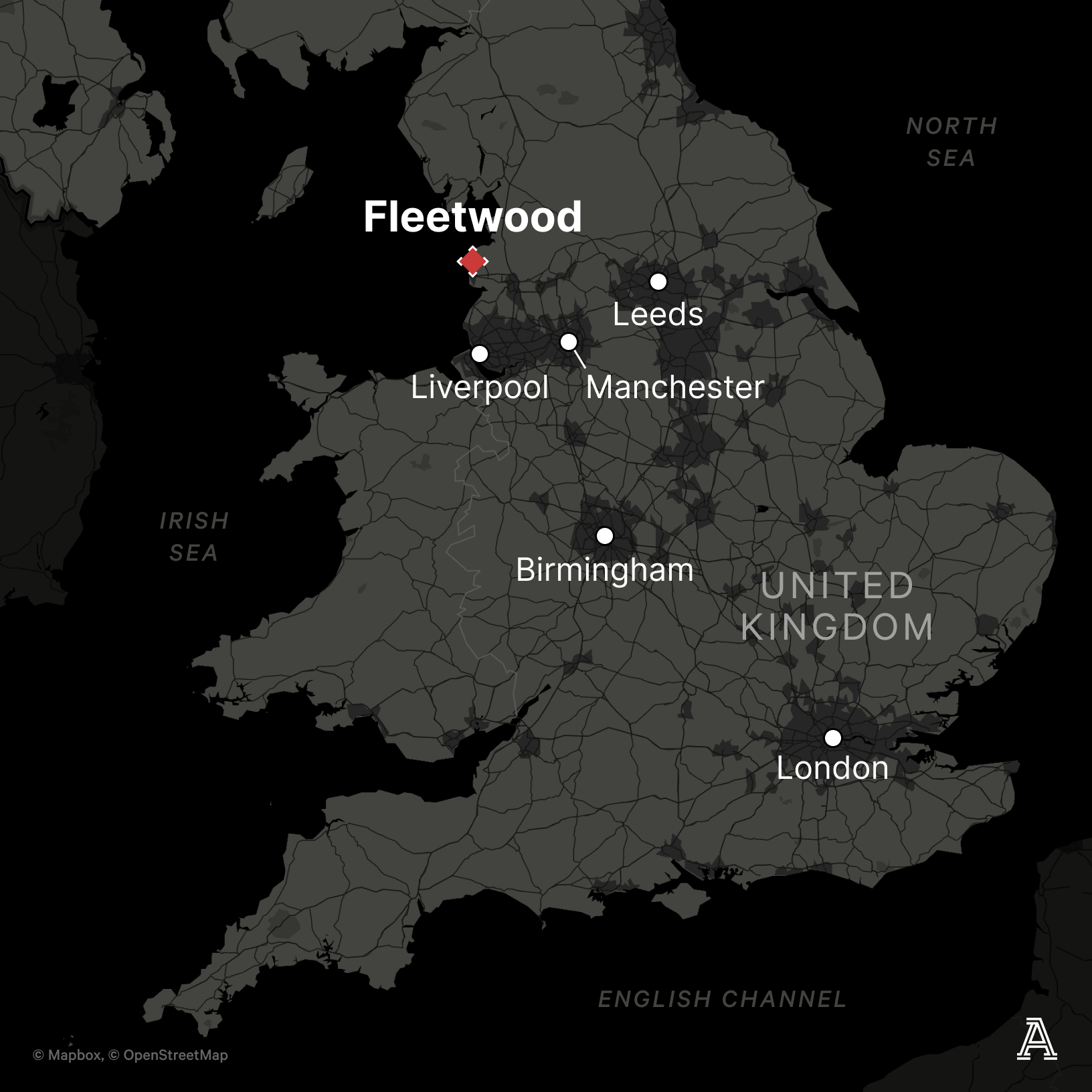
Almost half of its neighbourhoods are in the 10 per cent most deprived in the UK according to official government statistics. It is an isolated coastal town without a major employer or industry — meaning BES Utilities and Pilley’s other companies are a big deal, alongside the town’s other notable company, Fisherman’s Friend, a throat lozenge developed for fishermen working in the freezing Atlantic waters.
While stories of unscrupulous owners in English football often fit a standard template — overpromising and underdelivering — the Fleetwood story is different. In purely footballing terms, Pilley has been an excellent owner.
“When you look from the outside, they’ve got a very decent budget for (England’s third division),” says Simon Grayson, who managed Fleetwood for 43 games in 2021. “Never once did I think it was ever going to lead to this situation.”
Grayson says he had a good relationship with Pilley, who was ambitious while being “realistic” about Fleetwood’s ability to compete with the big hitters in the third tier, such as Sunderland, Sheffield Wednesday and Ipswich Town.
Pilley paid for Fleetwood’s Highbury stadium improvements as well as a state-of-the-art training centre at Poolfoot Farm, which was opened by Sir Alex Ferguson in 2016, with the media reporting the cost at £8million.
7⃣ years ago today, @PoolfootFarm opened its doors 🙌#OnwardTogether pic.twitter.com/cbLOJsmA6O
— Fleetwood Town FC (@ftfc) April 20, 2023
Fleetwood’s academy has ‘Category Two’ status on the Football Association’s 1-4 ranking, putting it ahead of most clubs in the third tier and on a par with Premier League teams.
The academy has produced players who have moved to the Premier League and played for England at junior levels — including James Hill at Bournemouth and Josh Feeney at Aston Villa — while younger age groups now play against ‘Category One’ academies in the region including Liverpool and Manchester City.
In 2022, Pilley also bought Waterford in the League of Ireland. Pilley is no longer listed as a director at the Irish club, but Waterford shirts were available for purchase in the Fleetwood club shop in September and several players have moved between the two clubs this season.
“One thing we recognise is that Andy Pilley has been very good for Fleetwood, the town itself and the football club,” says John Haw of the Energy Consultants’ Association, which represents energy brokers.
“He’s done quite a lot of good for charity there, but it seems to be coming at the cost of very vulnerable customers that have been caught up in this. It’s a bit like a Robin Hood that robs from the poor to give it to the poor — or a football club.”
“At the heart of the fraud was a web of interconnected companies that misled innocent small businesses across the UK,” said the sentencing remarks against Pilley in July.
“Through sham company structures associated with Business Energy Solutions Ltd, BES Commercial Electricity Ltd and Commercial Power Ltd, Pilley and his associates were responsible for targeting small business owners and deceiving them into signing long-term energy contracts between 2014 and 2016.”
Pilley was convicted of two counts of running a business with the intention of defrauding creditors, one count of false representation, and one count of being concerned with the retention of criminal property, all related to BES.
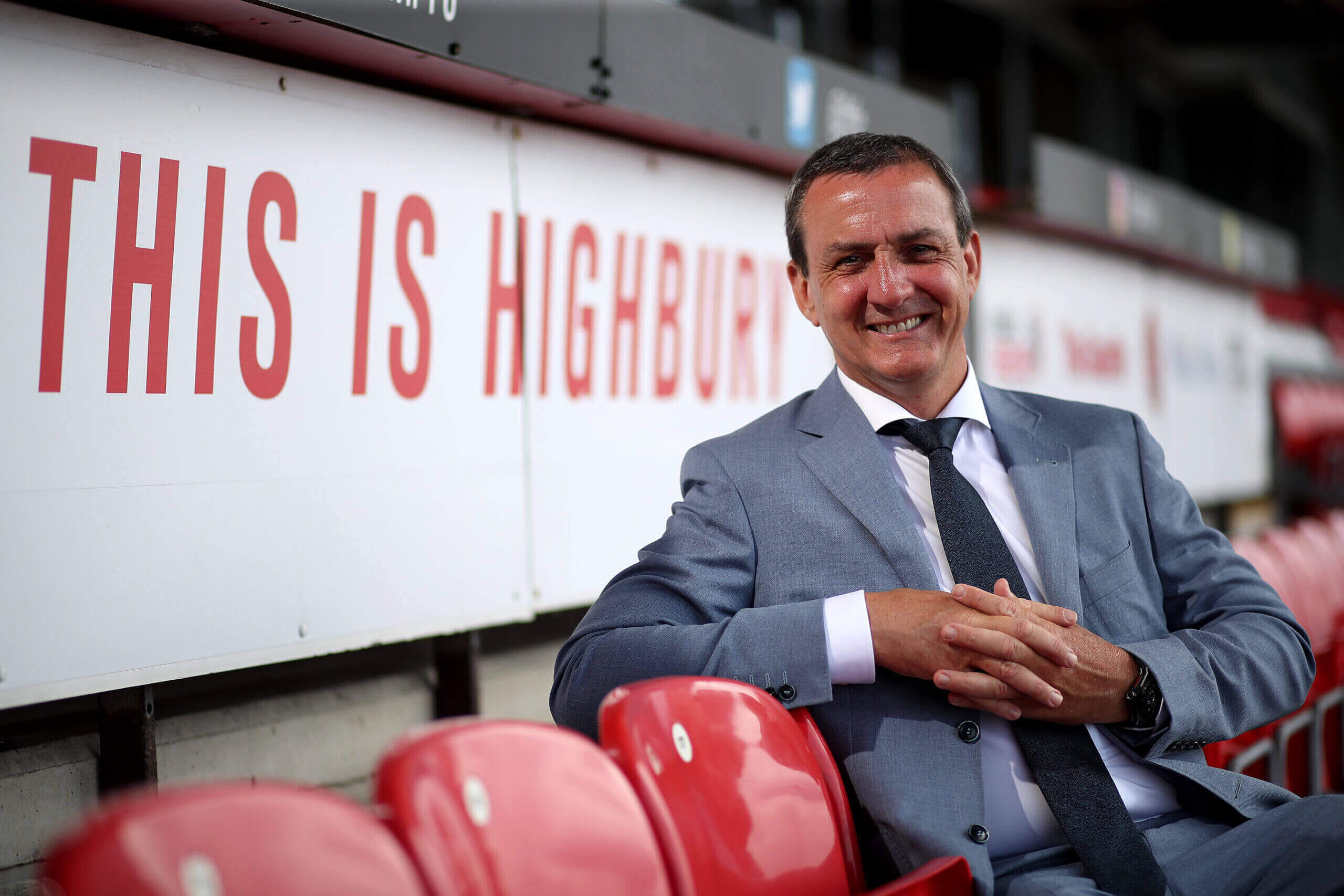
Pilley took Fleetwood through six divisions (Nick Potts/PA Images via Getty Images)
Judge Knowles KC said: “Cold-calling liars and manipulators duped very large numbers of honest and decent proprietors of sandwich shops, hair salons, small hotels and the like into long and expensive contracts for their gas and electricity.
“The bills they had to pay came to tens of millions of pounds… Pilley devised and enforced an elaborate pretence that the sales team were independent of the supply companies. The truth was that he owned them and he called the shots.”
The sentencing remarks against Pilley detail how brokers are meant to be neutral third parties finding the best deals for customers, akin to a price comparison website. However, Commercial Power put 85 per cent of its customers with BES Utilities, the energy firm Pilley owns.
“I can’t think of a reason why any broker would put 85 per cent of all of its customers with a single supplier,” says Haw. “It just feels inherently uncomfortable and I’m not aware of any other instance where a supplier also has a broker.”
“The convictions of the former owners of BES and Commercial Power relate to a very small proportion of customer contracts sold by certain brokerages between 2014 and the summer of 2016, some eight to 10 years ago,” BES responded to The Athletic.
“While we are extremely sorry that some customers received a poor experience following their dealings with independent sales agents, it’s important to stress no criminal charges have ever been brought against BES (or any other company).”
Tasmin Hirst, a BES customer, views the energy company as inseparable from the football club that has carried its logo on its shirts since 2011.
“We thought when (Pilley) went to prison they might have gone bust, but obviously no such luck,” Hirst tells The Athletic from her cat cafe in Wallsend, a suburb of Newcastle-upon-Tyne.
BES is still the club’s official sponsor — which gives the companies credibility some think they don’t deserve given Pilley’s frauds.
“If a football club proudly has a logo across their shirts and stadium, then people are going to sign up to that company because the name is going to ring a bell,” says Hirst.
“They’re going to think, ‘Oh, well, it’s been on a football strip, it must be fine’.”
Other clubs were left behind as Fleetwood rose rapidly through the divisions and have voiced concern about the fact the club was bankrolled by a man who has now been convicted of fraud.
Wrexham, now the subject of a hit Disney+ series documenting the fortunes of a club that spent 80 consecutive seasons in the English Football League before relegation in 2008, are one. They finally returned to the fourth tier this year.
But their comeback almost came a lot sooner. In the 2011-12 season, they won 30 out of 46 games and amassed 98 points, which in many seasons would be enough to win the league and gain automatic promotion.
However, they were just pipped to the post by Fleetwood, whose top scorer that season, Jamie Vardy (31 goals), went on to win the Premier League and FA Cup with Leicester City.
In 2011, Fleetwood had signed the striker from Northern Premier League side Halifax Town for £150,000, a huge sum at that level, though turned a healthy profit when they sold him to Leicester for £1million a year later.

Vardy’s goals helped Fleetwood into the EFL (Alex Livesey/Getty Images)
The Athletic has spoken to players who were part of the Wrexham squad during that 2011-12 season and they recall Fleetwood signing two key players — Andy Mangan and Lee Fowler — directly from the north Wales club. Fowler played half the season for Wrexham before moving in January.
“If it wasn’t for the money he (Pilley) was ploughing into the club, they wouldn’t have been as successful,” one former player, speaking on condition of anonymity because of the legal sensitivities of the Pilley situation, says. “It does leave a bitter taste in your mouth looking at where they are now.
“Maybe that should have been us 10 years earlier than Wrexham are now. It’s something that will always niggle that squad.”
“Fleetwood Town has been supported by legitimate businesses,” Fleetwood told The Athletic. “BES was described in the summing up by the judge in Andy Pilley’s court case as an ‘inherently legal business’. Any convictions were against individuals and not companies.”
In 2019, Pilley, via the Fleetwood Town website and Facebook page, officially endorsed the governing Conservative Party before that year’s general election.
“I can’t stress enough how concerned we are about the impact Labour’s policies would have on our business,” he said. “I don’t think it’s going too far to say the closure of BES Utilities would become a very real prospect — meaning the football club would also be likely to lose its Football League status, resulting in a further significant loss of jobs.”
The statement explicitly ties the future of BES Utilities to the future of Fleetwood Town — now BES is under an Ofgem investigation.
And Pilley still owns the football club. The EFL handbook says people are disqualified from being the director of a club if they are sentenced to longer than 12 months in prison, so Pilley is no longer a formal director of Fleetwood Town; he resigned upon his conviction last year and his two children, Jamie, 27, and Melissa, 19, have taken his place.
A statement on the Fleetwood website, though, says that a company called Jaymel Limited owns 97 per cent of the club.
The UK’s online company register details that there is only one “person with significant control” of Jaymel Limited: Andy Pilley, who has 75 per cent or more of the shares and voting rights and the “right to appoint and remove directors”.
The EFL Owners’ and Directors’ Test says the definition of a director includes “a person having control over a club”.
When an owner is convicted, the owner will need to divest their shares within 28 days of receiving “written receipt” from the league — but nine months on from Pilley’s conviction, although he has resigned as a formal director, he is still the owner of the club. The EFL and Fleetwood say this is an ongoing process.
The issue with Fleetwood Town is not what the money is being spent on or how the club is being run, it is where the money came from in the first place: companies owned by a man who has now been jailed for serious crimes.
However, the future looks uncertain regarding Pilley and his companies, with legal action bubbling against BES.
Phoenix Solicitors, a law firm based in Merseyside, says clients of BES Utilities “may be owed tens of thousands of pounds” in compensation and is encouraging people to get in touch.
And if any Ofgem fine or any other fallout from the frauds was big enough to threaten BES’ future, the club might lose its main sponsor.
“Since 2014, we have invested heavily in additional safety measures which protect customers from misselling. Sadly, the broker market is still unregulated, despite BES and many other suppliers calling for proper oversight of those selling energy to businesses,” a BES spokesperson said.
“To clarify, BES was fined a total of £2 in 2015 as part of a wider customer redress package which was agreed collaboratively with Ofgem,” added the spokesperson, referring to the outcome of a 2015 case which saw BES agree to pay £980,000 in total by way of settlement.
“With regard to our historic pricing for deemed customers, we continue to provide the regulator with our fullest cooperation and their enquiry is ongoing. You will note Ofgem’s press release confirmed there has been no finding of any wrongdoing at this stage and we remain confident in our position.
“There are over 10 live Ofgem investigations at present and no suggestion that this will result in any of these companies failing, or having their licences revoked. Finally, there is no longer any money owed by Fleetwood Town Football Club to either BES or Commercial Power.”
Pilley was the man who turned Fleetwood Town from a non-League minnow into an established EFL club, but his crimes mean he now has to follow their fortunes from a prison cell.
(Top photos: Getty Images; design: Eamonn Dalton)
